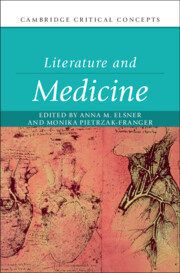Book contents
- Literature and Medicine
- Cambridge Critical Concepts
- Literature and Medicine
- Copyright page
- Dedication
- Contents
- Figures
- Contributors
- Acknowledgements
- Medico-Literary Pathways, Crossroads, and Side Streets
- Part I Origins: Histories
- Part II Developments: Forms
- Part III Applications: Politics
- Chapter 15 Malaria Literature
- Chapter 16 Forgotten Class
- Chapter 17 The Human Endeavour
- Chapter 18 Re-framing and Re-forming Disability and Literature
- Chapter 19 Overcoming Decline (in) Narrative
- Chapter 20 Literature as a Form of Care?
- Chapter 21 Literature in Collaboration
- Afterword
- Index
Chapter 21 - Literature in Collaboration
The Work of Literature in the Critical Medical Humanities
from Part III - Applications: Politics
Published online by Cambridge University Press: 17 January 2024
- Literature and Medicine
- Cambridge Critical Concepts
- Literature and Medicine
- Copyright page
- Dedication
- Contents
- Figures
- Contributors
- Acknowledgements
- Medico-Literary Pathways, Crossroads, and Side Streets
- Part I Origins: Histories
- Part II Developments: Forms
- Part III Applications: Politics
- Chapter 15 Malaria Literature
- Chapter 16 Forgotten Class
- Chapter 17 The Human Endeavour
- Chapter 18 Re-framing and Re-forming Disability and Literature
- Chapter 19 Overcoming Decline (in) Narrative
- Chapter 20 Literature as a Form of Care?
- Chapter 21 Literature in Collaboration
- Afterword
- Index
Summary
What might the medical humanities be capable of doing?’ asked Viney, Callard, and Woods in their 2015 call for a critical medical humanities. This chapter endeavours to answer that question by investigating how ‘the literary’ is mobilized in health-focused projects whose commitment to interdisciplinary entanglement renders them exemplary of the field’s critical turn. We interviewed seven UK-based literary studies scholars about their work in two or more such projects in order to understand how ‘the literary’ (as discipline, approach, and praxis) features within project design and delivery, the roles taken up by the literary studies scholar, and the consequent effects on shared understandings about the functions of the literary text. One of the most striking findings of this exploratory study was the interviewees’ determination for the literary text to be considered in non-representational terms and concurrent commitment to championing novel articulations of the value and ‘use’ of literary endeavour.
Keywords
- Type
- Chapter
- Information
- Literature and Medicine , pp. 357 - 374Publisher: Cambridge University PressPrint publication year: 2024

